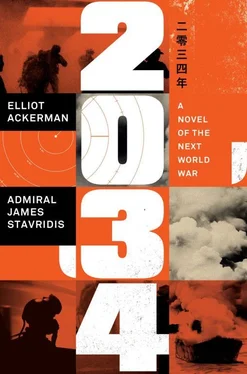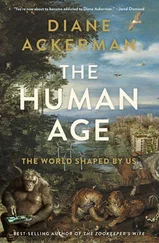Time passed strangely in the hours after the blackout. Everyone knew the minutes were critical, everyone could intuit that events of the type that shape history were unfolding at this very moment. But no one understood their form; no one understood what those events were or what that history would be. So much was happening—the Wén Rui , the F-35, Air Force One, which had seemed to vanish—and yet they had no news. Frantic as they were to understand the scope of this attack, they couldn’t even make a secure phone call. Everything had been compromised.
They carried on in a general, ineffectual frenzy, with Chowdhury and Hendrickson bunkered up in the Situation Room, leaning over its conference table, scribbling on legal pads, hatching plans and then discarding them. Until after a few hours Chowdhury’s boss, Trent Wisecarver, the national security advisor, stood in the open doorway.
At first they didn’t notice him.
“Sandy,” he said.
Chowdhury glanced up, stupefied. “Sir?”
Decades before, Wisecarver had played tailback at West Point, and he still looked the part. His shirtsleeves were rolled up over his thick forearms, his tie was loosened around his trunk of a neck, and his flop of salt-and-pepper hair was uncombed. He wore a pair of frameless eyeglasses (he was severely myopic) and looked as though he’d slept in his rumpled Brooks Brothers suit. “How much cash do you have?”
“Sir?”
“Cash. I need eighty bucks. My government credit card isn’t working.”
Chowdhury fished through his pockets, as did Hendrickson. Between them they came up with seventy-six dollars, three of which were in quarters. Chowdhury was passing the handful of coins and the crumple of bills to Wisecarver as they marched from the West Wing out toward the White House vestibule and North Lawn, where, pulled up on the curved driveway by the fountain, there was a metro taxi. A uniformed Secret Service guard handed Chowdhury the taxi driver’s license and registration and then returned to his post. Chowdhury’s boss curtly explained that his plane had been forced to divert to Dulles and land under the guise of a civilian aircraft. That meant no escort to meet them, no Secret Service motorcade, no elaborate security detail. POTUS herself was due back at Andrews within the hour. From Air Force One her communications proved limited, she could reach the four-star commanding general at Strategic Command and had spoken to the VP, but these carve-outs in their communications hierarchy were clearly designed by whoever instigated the attack as a way to avoid an inadvertent nuclear escalation. Beijing (or whoever did this) surely knew that if she had no communications with her nuclear capability, protocols were in place for an automatic preemptive strike. She did, however, have no direct communications with the secretary of defense, or any of her combatant commanders in the field other than Strategic Command. Establishing contact with them was Wisecarver’s job. Refusing to wait for official travel arrangements when his plane landed, he had rushed into the main terminal at Dulles and gotten in a cab so he’d have communications working at the White House by the time POTUS arrived. And here Wisecarver was, without a dime to pay the fare.
Chowdhury examined the taxi’s registration. The driver was an immigrant, South Asian, with a last name from the same part of India as Chowdhury’s own family. When Chowdhury stepped to the taxi’s window to hand back the documents, he thought to mention something about it but decided not to. This wasn’t the time or the place. Wisecarver then paid the driver, meticulously counting out the fare from the wad of cash and coins, while the twitchy Secret Service agent he’d traveled with scanned in every direction for threats, whether real or imagined.

10:22 March 13, 2034 (GMT+8)
Beijing
Lin Bao hadn’t slept much on the flight. When the Gulfstream touched down, he was shepherded by a heavily armed official escort—dark suits, dark sunglasses, concealed weapons—to the Ministry of National Defense headquarters, an ominous building in the heart of the smog-choked capital. Lin Bao guessed his escorts were officers of the Ministry of State Security but couldn’t be sure. Without a hello or goodbye or any pleasantry whatsoever, they brought him up to a windowless conference room on the building’s sixth floor and shut the door behind them.
Lin Bao waited. The conference table in the room’s center was massive, designed to receive international delegations and to host negotiations of the highest sensitivity. In a vase at the center of the table were some flowers, peace lilies, one of the few species that required no sunlight to grow. Lin Bao ran his fingers beneath their white, silky petals and couldn’t help but appreciate the irony of the choice in this place.
Also on the table were two silver platters, piled with packets of M&M’s. He noticed the writing on the packets: it was in English.
Two double doors at the opposite end of the conference room swung open. Startled, Lin Bao sat up straight.
Mid-level military officers flowed into the room, dropping down a projection screen, establishing a secure video-teleconference connection, and arraying fresh pitchers of water on the table. Then, like a tidal surge, they moved back through the door as quickly as they had appeared. In their wake a diminutive man entered the room, his chest glinting with a field of medals. He wore a tobacco-colored dress uniform made of fine but poorly cut fabric, the sleeves extending almost to his knuckles. His demeanor was gregarious and his earlobes pendulous, framing his very round face whose full cheeks creased in a fixed smile. His arm was extended in a handshake like an electric plug in search of a socket. “Admiral Lin Bao, Admiral Lin Bao,” he repeated, turning the name into a song, a triumphal anthem. “Congratulations. You have done very well.”
Lin Bao had never met the Defense Minister General Chiang, but that face was as familiar as his own. How often had he seen it hung in one of those hierarchical portrait collages that adorned the anodyne military buildings in which he’d spent his career? It was the minister’s smile that set him apart from the rest of the party officials who so assiduously cultivated their dour expressions for the photographer. His habitual courtesy, which could have been interpreted as weakness, was the smooth sheath that contained the force of his office. Minister Chiang gestured toward the silver platters spread across the conference table. “You haven’t touched your M&M’s,” he said, barely suppressing a laugh.
Lin Bao felt a sense of foreboding. If he assumed that Minister Chiang and the Central Military Commission had recalled him for a debriefing, he was quickly disabused of this belief. They knew everything already, including the smallest of details. Every exchange. Every gesture. Every word. Down to a single comment made about M&M’s. This was the point of the platters: to let Lin Bao know that nothing escaped their attention, lest he come to believe that any individual might assume an outsize role in this enterprise, lest he ever think that any one person could become greater than a single cog in the vast machinery of the People’s Republic—their republic.
Minister Chiang reclined in his plush office chair at the head of the conference table. He gestured for Lin Bao to sit beside him. Although Lin Bao had served nearly thirty years in his country’s navy, this was the first time he’d ever met directly with a member of the Central Military Commission. When he’d studied at Harvard’s Kennedy School as a junior officer and later at the US Naval War College in Newport as a mid-level officer, and when he’d attended exercises with his Western counterparts, he was always fascinated by the familiarity so common among senior- and junior-level officers in their militaries. The admirals often knew the first names of the lieutenants. And used them. The deputy assistant secretaries and secretaries of defense had once been Annapolis or officer candidate school classmates with the commanders and captains. The egalitarian undercurrents ran much deeper in Western militaries than in his own, despite his country’s ideological foundation in socialist and communist thought. He was anything but a “comrade” to senior officers or officials, and he knew it well. While at the war college in Newport, Lin Bao had studied the Battle of Kursk, the largest tank engagement of the Second World War, in which one of the great flaws of the Soviet army was that only command-variant tanks possessed two-way radios. The Soviets couldn’t see any reason for subordinates to speak up to their commanders. The subordinate’s job was solely to follow orders, to remain a cog in the machine. How little had changed in the intervening years.
Читать дальше













